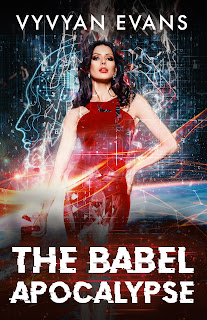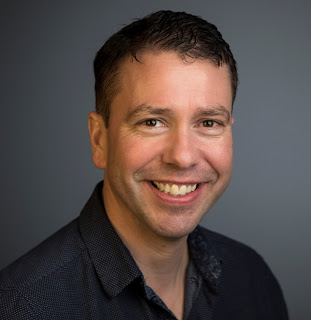This post is part of a virtual book tour organized by Goddess Fish Promotions. The author will be awarding a physical paperback copy of the book (available internationally) to a randomly drawn commenter. Click on the tour banner to see the other stops on the tour.
What is the favorite book you remember as a child?
James and the Giant Peach by Roald Dahl
What is your favorite book today?
Beloved by Toni Morrison.
Tell us about your current book in 10 words.
Makes you think about language in a whole new way.
What are you reading right now?
The Pilot: Planet Gallywood #2 by Andrew GillSmith. This series is the best thing since Douglas Adams’ The Hitchhiker’s Guide to the Universe series of books.
What books do you have on hold at the library?
Babel or the Necessity of Violence by R. F. Kuang
Do you have any bad book habits?
None that I know of. I always read and enjoy prologues. And I never cheat and read the ending first.
E-Reader or print? and why?
These days e-reader. They are cheaper than physical books, and I can travel with them.
One book at a time or multiples?
Multiples. I have several books on the go right now.
Dog-ear or bookmark? (don't worry—Librarian Judith won't hold it against you—much)
It’s always a bookmark!
Least favorite book you've read this year?
I don’t select books to read unless I think I will like them.
Favorite book you've read this year?
Our Lady of the Artilects by Andrew GillSmith.
When do you do most of your reading?
Usually in the evening, once the day is finished.
Favorite place to read?
On the sofa with a refreshing cold beer.
Favorite genre?
Always science fiction.
Do you loan your books?
Always happy to do so. Sharing is caring.
Favorite book to recommend?
Babel-17 by Samuel R. Delany. A classic sci-fi adventure featuring language as a weapon of mass destruction.
How do you keep your books organized?
In the future: On a large library-style bookshelf running round an entire room (the design is worked up) Currently: Lots of large piles taking up a good-sized room.
Re-reader or not?
Usually not, but it has been known!
What would make you not finish a book?
I don’t select books that I don’t think I’ll like. I have too many unread books on my TBR anyway.
Keep books or give them away?
Definitely keep. You never know when you need to look something up, or the desire to re-read strikes.
Language is no longer learned, but streamed to neural implants regulated by lang-laws. Those who can't afford language streaming services are feral, living on the fringes of society. Big tech corporations control language, the world’s most valuable commodity.
But when a massive cyberattack causes a global language outage, catastrophe looms.
Europol detective Emyr Morgan is assigned to the case. His prime suspect is Professor Ebba Black, the last native speaker of language in the automated world, and leader of the Babel cyberterrorist organization. But Emyr soon learns that in a world of corporate power, where those who control language control everything, all is not as it seems.
As he and Ebba collide, Emyr faces an existential dilemma between loyalty and betrayal, when everything he once believed in is called into question. To prevent the imminent collapse of civilization and a global war between the great federations, he must figure out friend from foe—his life depends on it. And with the odds stacked against him, he must find a way to stop the Babel Apocalypse.
Ebba was all too aware that she was viewed as an anomaly by pretty much everyone; she was neither feral nor out-soc. So, some of her students—especially those from outside the Republic, such as the Grand Union, and other places too—thought she must be breaking the law. It was a common misconception. She had even once been reported to the authorities by one of those types. For being an unchipped ghost, as they called her. That made her laugh; a dark laugh at the irony of it. The mutes, she called them. Those who had been fitted with Universal Grammar tech.
But while she officially resided in the Nordic Republic, and as long as she remained there, Ebba wasn’t doing anything illegal. The Republic was something of a curiosity even among Tier One states, never having passed a lang-law. Yet this singular absence was offset by the special requirements of Nordic birth licenses. To have one granted, prospective parents had to consent to their newborn being fitted with Universal Grammar tech. So everyone got a language chip at birth anyway, together with an ear implant transceiver. Which meant that voice command tech was, for all intents and purposes, de rigueur even without a lang-law. But that was the Scandinavian way. In the Nordic Republic, they organized freedom.
For her part, Ebba knew it wasn’t her. It was everyone else who had the problem. “That’s what you would think,” her braver, typically male students told her. “You’re Ebba Black.” Ha! Whatever that means. How do they know what Ebba Black would think anyway?
Dr. Vyvyan Evans is a native of Chester, England. He holds a PhD in linguistics from Georgetown University, Washington, D.C., and is a Professor of Linguistics. He has published numerous acclaimed popular science and technical books on language and linguistics. His popular science essays and articles have appeared in numerous venues including 'The Guardian', 'Psychology Today', 'New York Post', 'New Scientist', 'Newsweek' and 'The New Republic'. His award-winning writing focuses, in one way or another, on the nature of language and mind, the impact of technology on language, and the future of communication. His science fiction work explores the status of language and digital communication technology as potential weapons of mass destruction.
Book Website
Author Website
YouTube Channel
The Babel Apocalypse earned a starred review in Kirkus: "A perfect fusion of SF, thriller, and mystery—smart speculative fiction at its very best."
a Rafflecopter giveaway



Thanks for hosting!
ReplyDelete